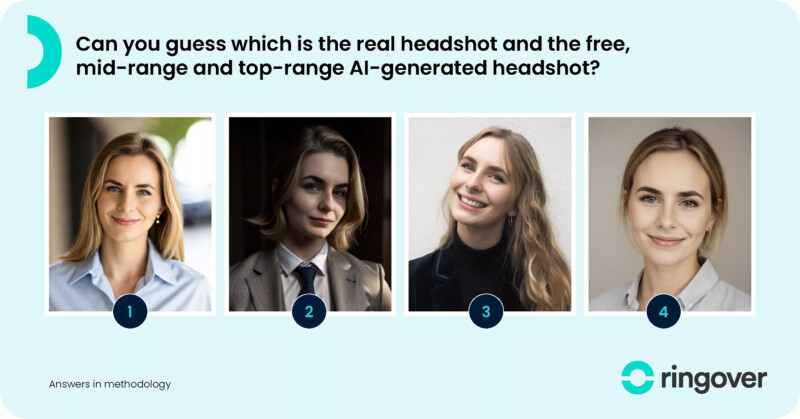Three-Quarters of Recruiters Prefer AI Headshots to Real Photos, According to Study

A study has found that the majority of recruiters prefer AI headshots to real headshots but only when they don’t know that the picture’s been AI-generated.
The study was carried out by Ringover which surveyed 1,087 recruiters about professional headshots in June 2024. Three women and two men took part and four AI headshot generators were used: A2E (a free service), Remini, PhotoPacks.AI (both mid-range services), and Aragon AI (the most expensive in the study).

When shown a mix of AI and real headshots, a shocking 76.5% of responders said they preferred AI ones to actual photos — but that was when they didn’t know some of them were AI.
Two-thirds of recruiters said they would be put off by a candidate who used an AI-generated headshot and nine in ten (88%) believe that it should be made clear when a candidate has used an AI-generated headshot.
![]()
The Recruiters Weren’t Very Good at Spotting AI Headshots
While the majority of recruiters think candidates should disclose an AI headshot, they “grossly overestimated” their ability to spot them.
“After completing the quiz, respondents were asked how accurate they were in identifying the AI headshots. Despite respondents incorrectly guessing most of the images, 80% thought they had been accurate or very accurate at spotting the AI headshots,” Ringover writes.
The recruiters could only accurately detect an AI-generated headshot 39.5% of the time. Respondents were incorrect half the time (52.9%) and 7.6% of responses said they “couldn’t tell”.
![]()
Not all AI headshot services are born equal, Ringover used four different AI headshot generators: Free, mid-range, and top-tier. Perhaps unsurprisingly the recruiters were able to identify AI headshots from the free generators most of the time (58.9%). Whereas the recruiters believed the headshots from the top-tier and mid-range AI image generators were real 60% of the time.
Interestingly, the recruiters were later asked if they would consider using an AI headshot themselves and 88% said they thought it would be an idea which Ringover says shows double standards.
“Two-thirds (66%) of recruiters said they would be put off by a candidate if they recognised their headshot was AI-generated. If you used a paid service it is likely the recruiter won’t realize — so is it worth the risk? Well, until it’s watermarked the data suggests an AI headshot could get you hired.”
Which headshots are AI and which are real? 1: Top-range AI headshot generator, 2: Free AI headshot generator, 3: Real photo, 4: Mid-range AI headshot generator.